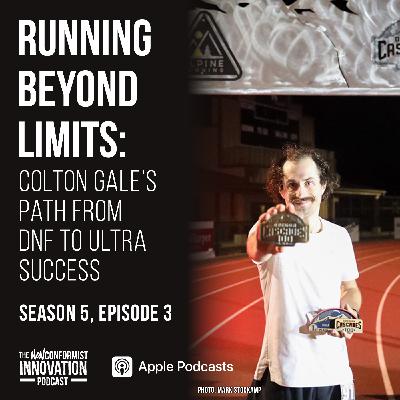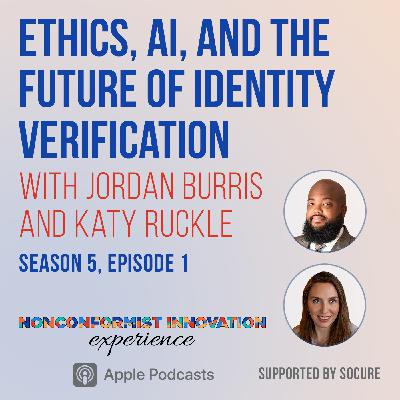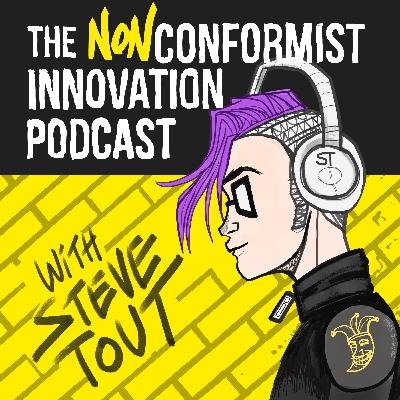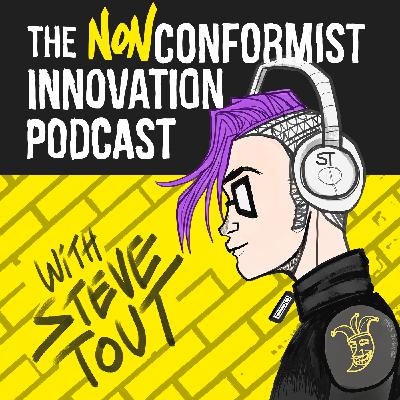Discover Nonconformist Innovation Podcast
Nonconformist Innovation Podcast

Nonconformist Innovation Podcast
Author: Steve Tout
Subscribed: 13Played: 36Subscribe
Share
© 2024 Nonconformist Innovation Media, LLC
Description
The Nonconformist Innovation Podcast was created to help you push boundaries, ask the difficult questions and differentiate your business in a hyper competitive marketplace.
16 Episodes
Reverse
In this episode of the Nonconformist Innovation Podcast, Steve chats with ultra runner and coach Colton Gale, who shares his incredible journey from lacrosse player to conquering 100-mile races. Colton dives into the highs and lows of ultra running, revealing his secrets to mental toughness, pacing strategies, and how he uses music as his secret weapon on the trail. He also opens up about overcoming injuries, the thrill of crossing the finish line, and his passion for coaching others to reach their potential. Colton’s insights go beyond running, offering life lessons on resilience, problem-solving, and the power of community. With stories of unexpected challenges, like busted shoes and surprise bear encounters, Colton’s enthusiasm and approach to embracing the adventure of ultra running will inspire you to push your own limits—whether on the trail or in everyday life. Tune in for an engaging, fun, and motivational conversation! Topics Covered: Colton’s transition from lacrosse to long-distance running through AmeriCorps Colton’s emphasis on the importance of community and camaraderie in running The mindset needed to overcome ultra-running challenges Colton’s focus on problem-solving and patience as core training philosophies How Colton adapted his training to prevent injuries and strengthen his core Managing effort and patience during ultra marathons Colton’s strategic use of music to enhance race performance Reflections on emotions when finishing his debut 100-mile race Lessons in patience and problem-solving learned from running Colton’s passion for coaching and helping others achieve success Handling gear issues and wildlife encounters during training runs Colton’s aspirations to compete in more 100-mile races and the Western States 100 Balancing competitive drive with the enjoyment of running Innovations in running gear and Colton’s favorite shoe brands Colton’s advice on transitioning from shorter races to ultra-marathons This episode is sponsored by Identient. Identient empowers businesses to innovate, modernize, and execute enterprise IAM initiatives and programs effectively. Visit Identient.com to learn more. Colton Gale on IG: @americolt Website: https://www.coltongale.com Oregon Cascades 100: IG @alpine.running Website: https://www.alpinerunning.co/cascades100 Photograph: Mark Stockamp IG @markstockampphotography Website: https://www.markstockampphotography.com Bear Butt Wipes: IG @BearButtWipes Website: https://bearbuttwipes.com FootZone: IG @footzonebend Website: https://www.footzonebend.com More episodes: https://www.nonconformistinnovation.com Thank you for listening!
In this episode of the Nonconformist Innovation Podcast, Steve is joined by Brian Chidester, Head of Industry Strategy for Public Sector at Adobe and former GTM leader at Socure. They dive into the critical role of digital identity in transforming customer experience within government services. Brian shares insights from his extensive experience and discusses the innovative approaches being used to enhance public sector engagement. The discussion covers the current state of identity fraud, highlighting key statistics from the Socure State of Identity Fraud 2024 report. They examine the challenges posed by siloed government portals, disjointed UX, and advanced security measures under scrutiny. Emerging technologies such as AI and biometrics are also discussed, with a focus on their impact on identity verification and fraud prevention. Listeners will gain a comprehensive understanding of the complexities involved in deploying identity verification across large enterprises and government agencies. The episode also explores practical strategies for modernizing digital identity protocols, emphasizing the importance of a foundational approach to seamless engagement and user-centric design in government services. This episode was recorded in Nashville, TN at the Identivation Conference in May, 2024. Show notes and more episodes at https://www.nonconformistinnovation.com
Welcome to Season 5 of the Nonconformist Innovation podcast. In this engaging episode, Steve has a conversation with Katy Ruckle and Jordan Burris about the future of identity verification, privacy implications, and the ethical considerations of AI in both the public and private sectors. They discuss the complexities of implementing biometric technologies, the regulatory landscape, and the importance of public-private partnerships in advancing digital identity solutions. Topics discussed: Exploring the balance between innovation in biometric technology and the necessity to protect privacy rights. Discussing the emerging regulations around biometrics and the variability across different states and vendors. Addressing the ethical implications of AI and the need for intentional and transparent use of data. Highlighting the importance of collaboration between government and private sector to improve digital identity solutions. The debate over opt-in versus opt-out privacy frameworks and the need for clear consent mechanisms. Examining the challenges of enforcing privacy laws and the trend towards granting individuals the right to enforce their own privacy rights. The tension between technological advancements in identity verification and maintaining privacy and security standards. The influence of state-specific laws on the use of biometric identifiers and the implications for businesses. The need for modernization in digital identity and the role of innovation in driving this dialogue. The practical difficulties of implementing powers of attorney and ensuring they are user-friendly and effective. Visit NonconformistInnovation.com for show notes and to listen to more episodes of the podcast Socure's The State of Digital Identity in 2024 © 2024 Nonconformist Innovation Media, LLC.
In this episode Steve has a conversation with Ann (Gregg) Skeet and Brian Green about the ethical challenges and risks of AI and disruptive technology, the role that leadership and culture play, and explores a pragmatic roadmap for providing technology ethics governance for leaders and organizations who wish to operationalize ethical principles and practices in their business. In this episode, Ann and Brian discuss their new book, Ethics in the Age of Disruptive Technologies: An Operational Roadmap. Link to eBook download at https://www.scu.edu/institute-for-technology-ethics-and-culture/#d.en.941248 Listen to more episodes of the podcast: https://www.nonconformistinnovation.com
In this episode, Steve has a conversation with Geeta Pyne. The conversation begins with Geeta's background as a boarding school student in Calcutta and moves to her discovery of advanced parallel computing in college, her current role as the Chief Enterprise Architect at Intuit, and her evolution and principles as an IT and business leader. During this episode, you will hear exactly how a leader at the top of her game breaks down complex challenges on the fly in real-time, applies optimism, courage, and science to solve hard problems, and uses architecture for the common good. Also on this episode, you will hear about Geeta's leadership approach which she refers to as ITRACCK, and her recommendations for not only succeeding but thriving through adversity as a minority in a male-dominated industry. Subscribe to the podcast and listen to more episodes on entrepreneurship, leadership, and innovation at https://www.nonconformistinnovation.com Thanks to Season 4 sponsors: BetterCloud - SaaS Management Platform https://www.bettercloud.com Secuvy - Data Privacy Management https://secuvy.ai
In this episode Steve has a conversation with Marina Nitze about political capital (what it is and how to get it), tackling big challenges, navigating organizational dynamics, inclusive innovation, hacking bureaucracy, and her affection for dry-erase boards. Marina is author of Hack Your Bureaucracy, and a partner at Layer Aleph, a crisis response firm that specializes in restoring complex software systems to service. Marina is also a fellow at New America’s New Practice Lab, where she works on improving America’s foster care system. She was previously the Chief Technology Officer of the U.S. Department of Veterans Affairs (2013-2017), helped found the United States Digital Service, and served as a Senior Advisor on technology in the White House under the Obama Administration. In the book, and during our conversation, Marina shares a story about how not even the leader of the free world could mandate that agencies and stakeholders cooperate with her vision and plans to make it easier for veterans in VA healthcare to get the services they need and consolidate over 1500 disparate websites into a single veteran-friendly website. I hope you find this conversation with Marina and her new book as insightful as I did. Share the links with a colleague or a friend, grab a copy of the book from your favorite bookseller, and get started with bureaucracy hacking today.
In this episode Steve has a conversation with Jamil Farshchi and Timothy Held about top cyber risks, leadership, innovation in cybersecurity, standards, regulations, and thoughts on the threat landscape for 2023. Jamil joined Equifax in 2018 and led an unprecedented transformation of the company’s security and technology capabilities. Today, Equifax is regarded as having one of the most advanced, effective, and transparent cybersecurity programs in business. Prior to Equifax, he was Chief Information Security Officer at The Home Depot, where he led the security turnaround for the Fortune 50 company following a high-profile data breach. Jamil serves as a Strategic Engagement Advisor for the FBI and serves on the Board of Directors for the National Technology Security Coalition. Tim joined US Bank in 2005 and leads a multidisciplinary information security team operating across the United States, Europe, and Asia, focusing on prevention, detection, and response. Tim is responsible for U.S. Bank’s cybersecurity architecture, engineering, security operations, incident response, data loss prevention, vulnerability assessment services, online fraud detection, security monitoring, insider threat, and cyber threat intelligence. Tim sits on several external committees and is recognized by the Security 50 Organization as one of the top 50 CISOs in the world. CISOs are not only responsible for the security posture of their organization, they are guardians of the teams, employees, customers, and stakeholders they serve. They have a difficult job to perform, and I do not envy them one bit. But I am grateful for their contributions to society, and I am grateful for Jamil and Tim taking the time to talk with me for this epic episode on cybersecurity leadership.
In this episode of the podcast, Steve has a conversation with Richard Clarke about how the threat of cyber war has evolved over the past decade, the politics of cybersecurity, and the need for accountable leaders in the face of evolving threats and emerging technology such as ransomware and artificial intelligence. Richard is one of the world's leading experts in security, cyberspace, and terrorism. He served in the Whitehouse for Reagan, both Bushes, and Clinton - appointed by Clinton as the National Coordinator for Security, Infrastructure Protection, and Counterterrorism. To listen to more episodes or join our periodic mailing list, visit https://www.nonconformistinnovation.com Thanks to our Season 4 sponsors: BetterCloud and Secuvy
In this episode Steve has the good fortune and rare opportunity to sit down with Andre Durand for a conversation about his founder's journey, his early experiences as an entrepreneur, scrounging dumpsters for bike frames that he could improve, and resell. Andre talks about what motivated him to start a company, how his best ideas came about, his thoughts about building teams, questions he asks of new hires, the legacy he hopes will endure, and how he fights entropy. Steve also asks Andre about his favorite music and the next concert he is planning to attend. Andre is the co-founder and CEO of Ping Identity, an identity security company he started in 2002. He has founded multiple companies including the instant messaging company Jabber, and earned a bachelor's degree in biology and economics from the University of California at Stanta Barbara. Andre was named CEO of the year by Vista Equity Partners in 2017 and led the company to IPO in 2019. To listen to more episodes or join our periodic mailing list, visit https://www.nonconformistinnovation.com Thanks to our Season 4 sponsors: BetterCloud and Secuvy
In the first episode of Season 4, Steve has a conversation with Beena Ammanath about her new book Trustworthy AI, ways that AI can be exploited, and considerations for chief security officers, data protection officers, security professionals, and others. We will also spend time looking at implications for ethics, trust, and privacy when working with AI, and how businesses can make sure AI is more inclusive and works for everyone. In this episode, Beena shares insights from a 6 dimension framework she put together to help us better understand and leverage AI in our work and lives. Beena is Executive Director of the Global Deloitte AI Institute and leads Trustworthy AI & Ethical Tech at Deloitte. She is the Founder & CEO of Humans For AI, a nonprofit organization focused on increasing diversity in AI. And in addition to being a self-proclaimed foodie, Beena is the author of the new Trustworthy AI which helps businesses navigate trust and ethics in AI. To listen to more episodes or join our periodic mailing list, visit https://www.nonconformistinnovation.com Thanks to our Season 4 sponsors: BetterCloud and Secuvy
In this epic episode Steve reconnects with former VMware colleague, Paul Chapman, to discuss the role that innovation played during VMware's rapid growth years. We take a look at Paul's illustrious career in IT leadership positions including his current role as the CIO at Cisco. We also revisit Nicholas Carr's question: Does IT Matter? and explore Paul's advice for healthy CIO-CISO relationships. During this episode, Paul reminds listeners that change is the only constant in business, and encourages us not to fall in love with technology. Finally, we discuss Paul's most provocative advice of all: technology is an implementation detail and innovative leaders are responsible for curating customer experiences.
In this episode Steve talks to founder and CEO Balaji Parimi about the launch of his company Cloud Knox Security, about his experience defining an entirely new category, about being named a pioneer by the World Economic Forum, and about his recent exit to Microsoft in July of this year. We conclude the conversation with his thoughts and advice for aspiring founders and start-up CEOS on building a team that can drive towards success, and his vision for the future of cloud security.
On this episode Steve has a conversation with Dushka Zapata, a communications professional and author about the importance of self care, empathy, rest and recovery in the COVID-19 era.
On this episode, Davi Ottenheimer delivers a clear and compelling argument that Ethics is security, that Facebook should not only broken up, but dissolved and that keeping markets free means removing things that harm the marketplace. And the most provocative question of all: is the US still in a civil war?
In this episode, Dr. Steve Herrod talks about how nonconformist innovation was used during his time as CTO of VMware (taking VMware from obscurity to massive success during his 12 years with the company) how start-ups should be thinking about innovation and how they must think scale and growth to be successful, and his thoughts on modern application security and Zero Trust security.
Tom Kemp shares his thoughts on start-up lessons learned, entrepreneurship, innovation, and tips for leaders to be more impactful in this episode.









